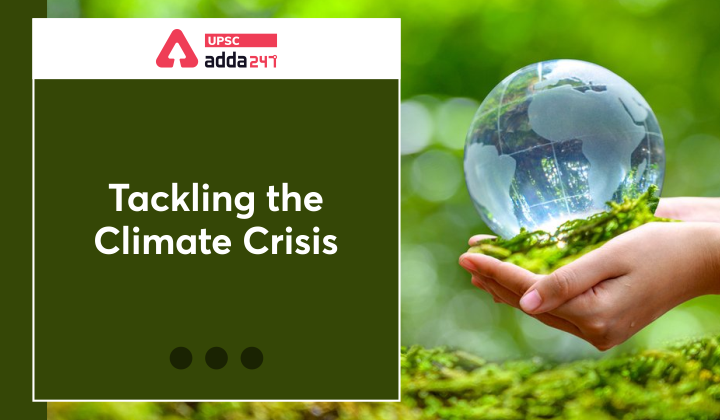Table of Contents
Tackle Climate Change- Relevance for UPSC Exam
- GS Paper 3: Environment– Conservation, environmental pollution and degradation.

Tackle Climate Change- Background
- The recently published Intergovernmental Panel on Climate Change (IPCC) Sixth Assessment Report from Working Group I makes a clarion call for climate action.
IPCC report’s Sixth Assessment Report
Tackle Climate Change – Intergovernmental Panel on Climate Change (IPCC) Sixth Assessment Report
- On Global Warming: The past decade (2011-2020) was warmer by 1.09°C than the period from 1850 to 1900.
- Prediction: IPCC report predicts that the 1.5°C global warming threshold is likely to be breached soon.
- On India: The IPCC report warns India against more intense heat waves, heavy monsoons and rises in weather extremes in the future.
- Extreme weathers: The Global Climate Risk Index (2021) ranked India the seventh-most affected country by weather extremes.
Bureaucracy’s Digital Challenge
Tackle Climate Change- Adaptation strategies by India
- India is targeting 450 gigawatts of renewable energy capacity by 2030 and it has launched mega solar and green hydrogen missions.
- Shoonya program by NITI Aayog: aims to accelerate the adoption of electric vehicles, is yet another effort towards the adoption of clean technologies.
- Other adaptation strategies: India has some dedicated initiatives towards adaptation, such as the National Action Plan on Climate Change and the National Adaptation Fund.
Stronger at the Grassroots- Making Disaster Resilience an Inherent Part of Community Culture
Tackle Climate Change – Way Forward
- Breakthrough on adaptation and resilience actions is needed to save hard-earned developmental gains and adjust to new climate conditions.
- Adaptation planning needs to go beyond a business-as-usual approach:
- A development-centric approach that aligns climate change, food security, and livelihood perspectives and takes into consideration regional specificities is crucial for reducing poverty and distress migrations.
- Governance at different levels needs to understand, plan, coordinate, integrate and act to reduce vulnerability and exposure.
- Strengthen adaptation and resilience:
- Improved early warning systems and forecasting: will help India better prepare for climate change with high-quality meteorological data.
- Premier research institutes can be roped in to develop regional climate projections for robust risk assessments.
- Develop well-functioning markets for environmentally friendly products and disseminate them for the desired behavioural change.
- This will result in the development of sustainable production systems.
- Encourage private sector participation: this will help in investment in adaptation technologies and for designing and implementing innovative climate services and solutions in areas such as agriculture, health, infrastructure, insurance and risk management.
- Protect mangroves and forests: to address climate-related risks by blending traditional knowledge with scientific evidence and encourage local and non-state actors to actively participate.
- Ensure climate-proofed social protection schemes: to create resilient infrastructural assets, diversify the economy and enhance the adaptive capacity of rural households.
- Effective feedback mechanisms: will help in continuous monitoring and evaluation and provide opportunities for mid-course correction.
- Periodic fine-tuning of State Action Plans on Climate Change is crucial to systematically understand micro-level sensitivities, plan resource allocation, and design responses to serve at different levels of intensities of climate hazards.
Peace at the Heart of Education
Tackle Climate Change- Conclusion
- A more collaborative approach towards climate change adaptation is crucial. Next-generation reforms will promote new business and climate service opportunities across several sectors and thus create a sustainable economy.



 TSPSC Group 1 Question Paper 2024, Downl...
TSPSC Group 1 Question Paper 2024, Downl...
 TSPSC Group 1 Answer key 2024 Out, Downl...
TSPSC Group 1 Answer key 2024 Out, Downl...
 UPSC Prelims 2024 Question Paper, Downlo...
UPSC Prelims 2024 Question Paper, Downlo...





